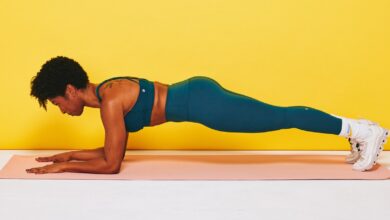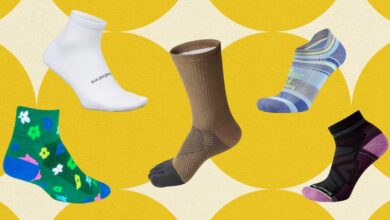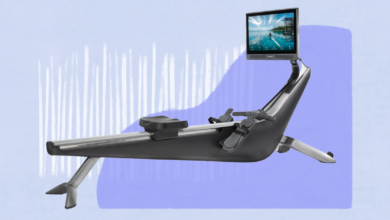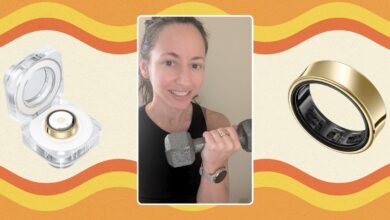What It’s Actually Like to Live in the Olympic Village, According to the Athletes
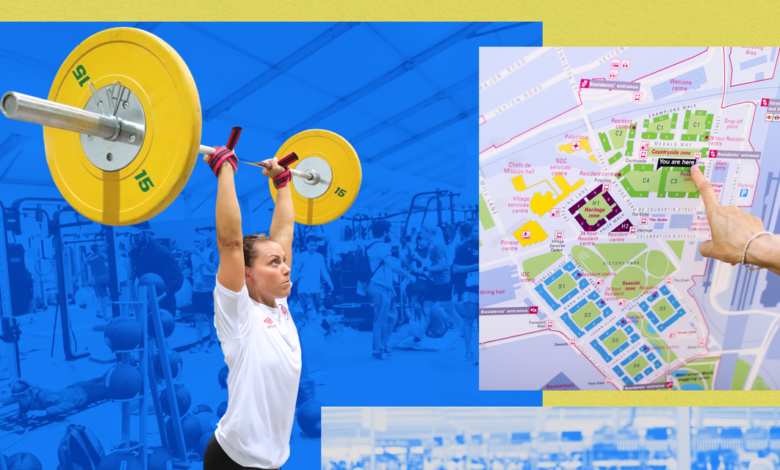
When you turn on the TV later this month, you’ll see the Olympics in all its glory—athletes flipping in the air, kicking through the water, and sprinting around the track, among other eye-popping feats. And the Paralympics, beginning August 28, will only continue with the momentum.
But what happens behind the scenes, in the storied Olympic and Paralympic Village, when the cameras are off? Athletes eat, sleep in cardboard beds, play Mario Kart, train and recover, and connect with friends and idols alike as they all prepare for—and celebrate or mourn after—one of the biggest events of their lives. Here’s more about exactly what they experience, from a dozen athletes who know it best.
The vibe is generally upbeat and pretty intense.
“It’s electric, it’s global—it’s a community that’s vibrant. Everyone’s so excited and happy to be there—it’s like, ‘We made it to the Olympics. This is our dream.’ There are athletes from all over the world, from different walks of life. It’s so cool.”—Helen Maroulis, wrestler who won bronze in Rio in 2016 and gold in Tokyo in 2020
“It’s crowded! It’s kind of ironic because you think of the Olympics as this elite sporting event where such a small percentage of people ever get to go, but then you’re in the Olympic Village with thousands of people. At the same time, it’s super fun and you feel how special it is.”—April Ross, beach volleyball player who won silver in London in 2012, bronze in Rio in 2016, and gold in Tokyo in 2020
“You experience the Olympic and Paralympic spirit to the fullest extent in the Village. Everybody there is an elite athlete and they’re so proud to be there representing their country. There’s a buzz around competition and wanting to meet other people.”—Nicky Nieves, sitting volleyball player who won gold in Rio in 2016
“It’s chaotic. Typically, the marathons are towards the end of the program. So you have this real festival vibe, and then you have a very serious, I’m focused on the biggest event of my career vibe, and it’s a lot to balance. But it’s fun. You also appreciate all the different body types of sports with high-end, elite athletes all being in the same place. You realize athleticism doesn’t have one look. It’s so broad.”—Des Linden, marathoner who competed in London in 2012 and Rio in 2016
“I had this feeling when I walked in like I was in the superhero village. The fastest people, the strongest people—everybody was living there. They’re the real-life superheroes in terms of strength and physical capabilities.” —Marta Pen Frietas, middle-distance runner who competed for Portugal in Rio in 2016 and Tokyo in 2020
But the mood isn’t all sunshine and rainbows.
“Something people don’t talk about much is how heavy it is after competition in the Village. You worked so hard for a moment of your life—it’s 10 seconds if you run the 100 meters, four minutes if you do the 1500 meters. Then you’re like, this just happened, this moment is gone. And sometimes people are just heavy, because things didn’t work out the way they wanted. Not everybody wins at the Olympic Games. So you have very high party energy, or sometimes very low energy. Middle energy is very rare.” —Pen Frietas
The dining hall comes with any dish you could want—and a LOT of traffic.
“The dining hall is out of this world. In Tokyo, it was two floors; in Rio, it was the size of a soccer field. There’s every type of food you could imagine. It’s interesting people-watching too. I remember distinctly that the Chinese gymnasts in Rio had trays and trays piled high with only pineapple. Then you see giant weightlifters carrying five massive trays of food. It’s fascinating.”—Kat Holmes, fencer who competed in Rio in 2016 and Tokyo in 2020
“We established the first day where we’d sit; it’s so busy. It took a few days to get used to the food. You go from being super strict with your diet to having absolutely every option you could want. In Tokyo, they had local cuisine as well. I ate so much sushi, although there was no raw fish—it was pretty much just vegetable sushi, which was still amazing.”—Morgan Lake, high jumper who competed for Great Britain in Rio in 2016 and Tokyo in 2020
“They set it up so it’s streamlined. There are condiment stands all over the place, so there’s no large grouping of people. In Tokyo, they had two floors that were mirror images of each other. They also had a separate dining hall highlighting a different area of Japan’s cultural cuisine each day.” —Susannah Scaroni, Paralympic wheelchair racer who competed in London in 2012, Rio in 2016, and won gold and bronze in Tokyo in 2020
“The biggest thing is just figuring out where the things are that you like to eat at home. A lot of times you might go get your protein from one stand, but there’s another stand that has more cooked vegetables, so you kind of pick and choose to piece your meal together. Beijing had a McDonald’s in the cafeteria, which was the only Games it was like that—most of the time, it’s somewhere else in the Village.” —Brady Ellison, archer who won silver in London in 2012, silver and bronze in Rio in 2016, and competed in Tokyo in 2020
“It’s nice to have reliable staples so you stay grounded when there’s so many options. You’re trying to figure out when you can tinker around and have fun, and when you go to the tried and true. You typically find yourself teaming up with your roommate or people in your event group to walk over together, because you’re on the same schedule. That makes it easier to kind of think through these things.” —Linden
But that’s far from the only place to grab a snack or drink—or that critical caffeine boost.
“The little snack stations are the best part. You can slowly eat your way through the Village. You get this little fob that works at any Coke machine in the entire Village. I’m not a big soda fan, but you could get soda or water or sports drinks.” —Kat Holmes
“In London, they had these coffee kiosks in adorable wooden trailers. They were all over the Village, and we had one right outside the USA building. You could take your little keycard and get free coffee, free snacks. There was a barista and everything—it was a full food truck.” —Scaroni
“Tokyo had great coffee stations. You could do the pre-programmed espresso drinks. If you hit it at the wrong time, though, the lines would be so long. I don’t know if people think athletes stay away from coffee, but that was definitely the most popular thing.”—Ross
Security is tight, but you can get a pass so non-athletes can visit (except during COVID, of course).
“Every time you enter the Village, you go through security like you’re going to airport TSA. You have to scan in your credentials. There’s this big TV, and so your face is just plastered for everyone to see—and of course, the picture is always stretched out and never cute.”—Oksana Masters, Paralympic rower, cross-country skier, and cyclist who won bronze in London in 2012, competed in Rio, and won two golds in Tokyo in 2020, along with 15 medals in the Winter Games
“They give you so many passes a day for friends and family, and then you check them in. Of course, they have to go through the whole security thing with your ID and all that stuff. But they can come in and see the Village, the dining hall. They have to be chaperoned by you, but they get a glimpse of what it’s like in a little city of athletes for two weeks.” —Nieves
Things are pretty spread out, so getting around can be kind of a pain.
“Each Village feels similar, but the proximity to the cafeteria is different. In Rio, I want to say it was a quarter-mile to half-mile walk to get there. You’re going to breakfast, lunch, and dinner, you’re doing your training, and then all of a sudden, you realize you’re putting extra miles on your body. In London, everything was really close and easy to get to, or you could use public transportation and be on your way pretty quickly.” —Linden
“Team GB got us bikes called Bromptons, the ones that fold up. We got to use those for cycling around the Village, which made it so much easier. Going on bikes saved your energy and also meant you could see more. In Tokyo, you had to leave the Village 48 hours after you competed. I was right at the end, so I got to stay for the whole thing. By the end, it was quite empty, and I remember cycling round and round.” —Lake
“The hardest thing in the Paralympic Village is that almost everyone needs to use an elevator, so there’s a lot of waiting. You have hundreds of athletes at once, in all these blocks and buildings, trying to get around to races or to the bus. You have to have your time down and know that things are going to take longer than you think, especially if you’re directionally challenged like me—I get lost in my backyard, so I definitely get lost in the Village.”—Masters
There’s medical care, if you need it.
“There’s a polyclinic [a dedicated 24-hour healthcare facility] in the Village. There, they have X-rays, MRIs, that kind of thing, for things like broken legs or bigger problems. If you need to go, one of our doctors will usually go with you. They can also help you if you need medicine—there was a time that I ran out of thyroid medicine and I went to the polyclinic to get it.” —Ellison
And a solid amount of time to chill by playing games, shopping, and watching your teammates.
“They have little game rooms for the athletes to go hang out and relax. There are cultural centers, where you can learn about Rio or Japan. They have scavenger hunts through the Village—you run around and find different things and get little stickers, and you can win a prize. And they always have the Olympic rings. You have to get a photo with those while you’re at the Games.” —Holmes
“There was a gaming room with table tennis and pool, Mario Kart, and different arcade games as well. You’d see people in different sports, different nations, all playing there.”—Lake
“Different Olympic sponsors will have booths or buildings set up. There was a place where you could go and get your feet measured for some free shoes, made for you right there. There is a lot of free stuff. They have a hair salon and a nail salon, where you can get your nails done with your country’s flags or other designs. Then there are the gift shops, with all the official Olympic gifts—those, you pay for. It’s like the airport gift shop on steroids, with mugs and T-shirts and keychains and more. I bought a ton of stuff, a lot of thank-you gifts for people who helped me along the way.”—Maroulis
“In Rio, they had this nice corridor park down the middle, where you could walk at night. Because the stress was so high, it was almost like a walking meditation through the garden. They also had a skate park in there and it just felt very happening, like a little city.”—Ross
“My downtime was primarily watching Americans win medals at the Games. In Beijing, I had hung out and I trained a lot with the softball team during the year, so we went and watched almost all of their games. We try to get whatever tickets we can to watch Team USA around our own competition schedule. When we can’t go in person, I love parking myself in front of the TV. It has 40 channels, each one a live feed from a venue. You can watch almost any different sport.”—Ellison
“There might be a TV in each room or the common room of your apartment, and then there are TVs in the dining hall too, with the Paralympics on. It’s so cool because you’re truly that much more connected and able to follow along. The quality of coverage for the Paralympic Games is getting better and better, but it’s not nearly the same as when you’re there.”—Masters
Swapping pins (and other stuff) is huge.
“Trading pins is a big thing. Team USA gives you a bag of pins and you’re going around trying to get all the countries you can. You put them on your lanyard. Mine was full and heavy. You’ll also bring stuff you don’t necessarily use or want to wear anymore to trade—you might bring a shirt and get a jacket from Ukraine, for example. Even if you don’t speak the same language, it’s a common connection.” —Nieves
COVID changed a lot of things about the Tokyo Village, but there was still some Olympic spirit.
“Everybody was terrified of talking to anybody else. In Rio, it was like, ‘We’re here together, we’re gonna get to know each other.’ In Tokyo, it was like, ‘Oh, my God, don’t breathe on me.’ In the dining hall, you had to put on gloves and sit between plastic barriers. We wore masks at all times. It was pretty much eat, train, stay in your room—very restrictive.” —Holmes
“It was nerve-wracking. Every morning you had to test, and it was this weird way of testing where you had to spit in a vial. I felt bad for the guy who had to collect the samples. We felt like we were being safe, but you didn’t know. Several beach volleyball players were quarantined because they were sitting in a certain row on the plane and another passenger tested positive. My partner Alix [Klineman] and I feel really lucky that we ended up not having to do that.”—Ross
Even Olympic champions geek out about meeting other athletes.
“Every Olympian has their idols. One day, [Novak] Djokovic decided to practice in the Olympic Village. Everybody was just going crazy, because everybody knows who Djokovic is—there were so many people watching. Another fun moment was with Usain Bolt. He showed up at the cafeteria and sprinted from one side to the other. A lot of people tried running to catch him. Serena Williams gave me one of her pins, and I gave her one of mine.”—Pen Frietas
“Everyone is someone—everyone in there has accomplished quite a bit. There’s kind of an awe in general and a curiosity. One cool moment for me was meeting [decathlete] Ashton Eaton, who’s just this incredible athlete. You’re like, ‘This guy could totally be a jerk if he wanted to.’ He shakes my hand and my hand disappears; he could crush all my fingers. But he’s the nicest guy you’ll ever meet. It’s cool to meet your heroes and have them hold up to what you would want them to be.” —Linden
“In London, I got to talk to Kobe [Bryant] for a long time—like, 15 minutes. We were walking through the Village to do the opening ceremonies and I ended up next to him. We started talking about California, and then I got to pick his brain a little bit about mindset and how he approached the Olympics. He talked about how we’d already done the work. Go out and compete acting like you’re the best, knowing that you can do it, he said.”—Ross
“In 2012, the USA women’s water polo team went to the USA men’s basketball training camp in Vegas and got to know them well. At opening ceremonies, we were together and had created this little bond. They’re so famous that I think it was nice for them to have people to be normal with. At one point, we even made a circle barricade around LeBron James so he could get a break from photos and find his teammates. When that broke up, he put his arm around my neck and was like, ‘I’m taking all these photos. You’re taking them with me.’ So people from all over the world are trying to take pictures with LeBron and then there I am, this random five feet eight woman in the photo.” —Maggie Steffens, water polo player who won gold in London in 2012, Rio in 2016, and Tokyo in 2020
“As a double above-the-knee amputee, we’re so rare. When I saw Vanessa Low—she’s a track-and-field athlete in the long jump—in Tokyo, I wanted to ask her so many questions. Our amputations are so similar and she walks so well, but I didn’t get a chance to say hi. I hope I have the chance and the courage to talk to her in Paris. Meeting swimmer Jessica Long in real life for the first time was a starstruck moment. We’re friends now, but back in 2012 I was starting out, and she had an incredible Games. She was a household name at that point.”—Masters
“I met Michael Phelps in the elevator in Rio. I obviously knew who he was, but he didn’t know me. He was asking me about water polo and wishing me good luck. It feels like everyone’s on the same playing field and the respect is there.”—Maddie Musselman, water polo player who won gold in Rio in 2016 and Tokyo in 2020
And, of course, there’s always time for celebrating.
“There are parties in the Village. The way you talk about it is like, ‘Oh, Team Germany’s having this DJ, the English House is having a party.’ We don’t really have time to go to those because we’re still competing. Before a gold-medal game, your nerves are already high, your adrenaline’s high, you’re trying to sleep and you can hear untz, untz. While people are celebrating or mourning the Olympics next door, there are athletes still competing. You just have to try to tune it out.” —Steffens
“On one of the Team USA floors, they have a tracker with all the medals. When someone who wins comes in, they’re like, ‘Woo-hoo!’. The sports med team, your team, your coaches, and all the staff celebrate with you. It’s that much better to have the whole Village there that helped you to get to that podium, to help you get that medal, and to be able to come home and say thank you to them that night.” —Masters
“I don’t remember what they won, but Australia had a huge party in their building. To be frank, there was tons of alcohol. Some people were playing games. There was music—I don’t think it was a DJ, but I feel like athletes always have speakers. So either you’re playing a game or you’re talking to a random athlete: ‘What sport do you play, how’d you do?’ I met people from Brazil, from Zimbabwe, talking and joking and taking selfies and doing handstand contests. It’s so fun. Your inner child is released because you’re just so happy, all the endorphins are flowing, and it’s just one big party.” —Nieves
SELF is your one-click source for all things Summer Olympics. Read our latest coverage of the Paris Games here.
Related:
